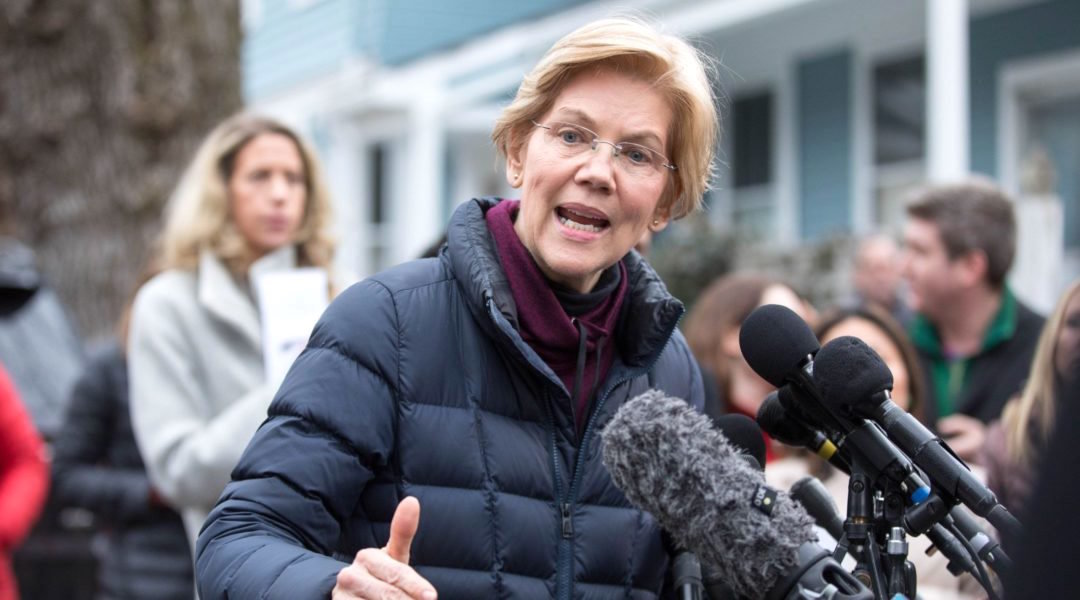Progressive Warren: Both supportive and critical
This is one of series articles on what eight of the Democratic presidential hopefuls have said or done regarding Israel and other Jewish concerns. It was assembled by the staff of the JTA before the latest debate and edited by The Jewish Star for space and style. Link here for the other candidates: Amy Klobuchar, Andrew Yang, Bernie Sanders, Cory Booker, Elizabeth Warren, Joe Biden, Mike Bloomberg, Pete Buttigieg
Elizabeth Warren, the progressive senator from Massachusetts, emerged early on as a front-runner in the crowded Democratic primary race. Let’s dive into her positions on all things Jewish.
First up: What has Warren said and done to address anti-Semitism?
“Let’s be clear, anti-Semitism has no place in democracy,” Warren said in a June 2019 address to the American Jewish Committee Global Forum. She called anti-Semitic graffiti in her home state “cowardly acts of hate” and condemmed the defacement of Jewish gravestones in Fall River, Massachsusets as a “hateful act.”
After the Pittsburgh synagogue shooting in October 2018, Warren attended Shabbat services at Temple Emanuel in Newton, Mass., as a part of the #ShowUpForShabbat campaign organized by the American Jewish Committee. At Temple Emanuel, she led the congregation in reciting a prayer for the welfare of the United States.
After Rep. Ilhan Omar was criticized for anti-Semitic remarks about Jewish wealth and influence and the House voted on a resolution to condemn anti-Semitism and other forms of hate, Warren slammed the resolution. She said it was an attempt to silence debate, arguing that “branding criticism of Israel as automatically anti-Semitic has a chilling effect on our public discourse and makes it harder to achieve a peaceful solution between Israelis and Palestinians.”
What does Warren say about BDS?
“I don’t support the boycott, I think the boycott is wrong, but I think outlawing protected free speech activity violates our basic constitution,” she said in response to the controversial Israel Anti-Boycott Act, which she voted against in February 2019.
Her director for progressive partnerships, Max Berger, helped found the anti-occupation group IfNotNow and tweeted in 2017 that he “agree[s] with BDS.”
What American Jewish groups does she work with?
As a senator, Warren accepted the endorsement of J Street.
During the government shutdown in late 2018 and early 2019, she pledged her salary to HIAS, a Jewish non-profit that supports refugees. (Salaries of Congress members were not frozen during the shutdown.)
On Israel in general?
She’s supportive, yet critical of some of its policies.
“Israel lives in a dangerous part of the world where there are not a lot of liberal democracies,” Warren said shortly after declaring her presidential bid. “We need a strong Israel there.”
“America has a very special relationship with Israel,” Warren said in an August 2014 town hall. “Israel lives in a very dangerous part of the world. … And we very much need an ally in that part of the world.”
However, in a video Q&A with the New York Times in June 2019, Warren said “the current situation” in Israel-Palestine is “not tenable.” When an IfNotNow member asked her if she would “push the Israeli government to end the occupation” in July, she said yes.
What about the conflict in general?
In 2014, she voted in favor of $225 million in funding for Iron Dome, Israel’s missile-interception system. She also defended Israel’s actions during the 2014 Gaza War, explaining, “When Hamas puts its rocket launchers next to hospitals, next to schools, they’re using their civilian population to protect their military assets. And I believe Israel has a right, at that point, to defend itself.”
In 2015, she voted for the Iran nuclear deal that Netanyahu opposed.
In April 2018, during the protests of Israeli occupation at the Gaza border, Warren urged Israeli restraint. “I am deeply concerned about the deaths and injuries in Gaza,” she said. “As additional protests are planned for the coming days, the Israel Defense Forces should exercise restraint and respect the rights of Palestinians to peacefully protest.”
Warren supports a two-state solution. In October 2019, he said that “it is the official policy of the United States of America to support a two-state solution, and if Israel is moving in the opposite direction, then everything is on the table.”
Would Warren would leverage U.S. aid?
When asked at a speech in October if she meant using aid to pressure Israel, Warren didn’t specify, and repeated that “everything is on the table.”
In in a video address to the 2019 J Street conference, she said, “We must find ways to make tangible progress on the ground toward a two-state solution. Sometimes that might mean finding ways to apply pressure and create consequences for problematic behavior as previous Democratic and Republican presidents have done.”
“For example,” she continued, “if Israel’s government continues with steps to formally annex the West Bank, the United States should make it clear that none of our aid should be used to support annexation.”
How does Warren get along with Netanyahu?
“Let’s be clear: We can speak out against the far-right-wing policies of the Netanyahu government like annexation and settlements while supporting Israel,” Warren said in her 2019 J Street video.
In November 2017, Warren was one of ten senators to sign a letter to Netanyahu urging him to not demolish the Palestinian villages of Sussia and Khan al-Ahmar. Israel said both were unauthorized.
Jewish fun fact
Warren has been endorsed by Jewish celebrities such as Amy Schumer, Barbra Streisand, Bette Midler, Gloria Steinem and Scarlett Johansson.

 50.0°,
Overcast
50.0°,
Overcast 




